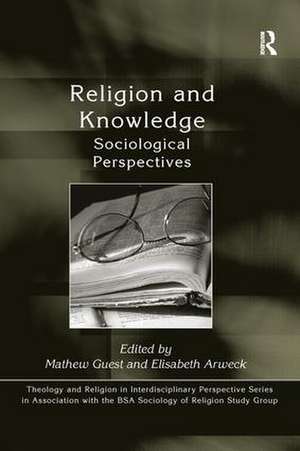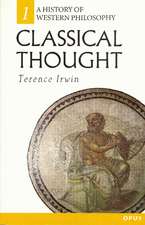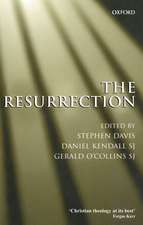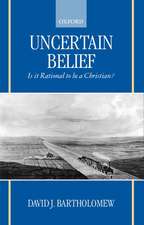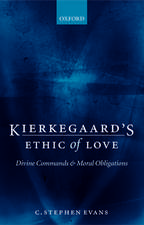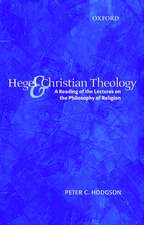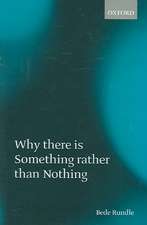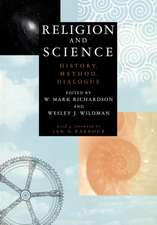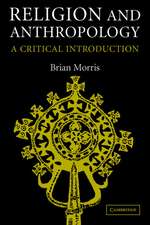Religion and Knowledge: Sociological Perspectives: Theology and Religion in Interdisciplinary Perspective Series in Association with the BSA Sociology of Religion Study Group
Editat de Mathew Guest, Elisabeth Arwecken Limba Engleză Paperback – 28 oct 2016
| Toate formatele și edițiile | Preț | Express |
|---|---|---|
| Paperback (1) | 469.34 lei 6-8 săpt. | |
| Taylor & Francis – 28 oct 2016 | 469.34 lei 6-8 săpt. | |
| Hardback (1) | 1064.04 lei 6-8 săpt. | |
| Taylor & Francis – 28 noi 2012 | 1064.04 lei 6-8 săpt. |
Preț: 469.34 lei
Nou
Puncte Express: 704
Preț estimativ în valută:
89.81€ • 93.96$ • 74.60£
89.81€ • 93.96$ • 74.60£
Carte tipărită la comandă
Livrare economică 03-17 aprilie
Preluare comenzi: 021 569.72.76
Specificații
ISBN-13: 9781138256897
ISBN-10: 1138256897
Pagini: 308
Dimensiuni: 156 x 234 x 26 mm
Greutate: 0.45 kg
Ediția:1
Editura: Taylor & Francis
Colecția Routledge
Seria Theology and Religion in Interdisciplinary Perspective Series in Association with the BSA Sociology of Religion Study Group
Locul publicării:Oxford, United Kingdom
ISBN-10: 1138256897
Pagini: 308
Dimensiuni: 156 x 234 x 26 mm
Greutate: 0.45 kg
Ediția:1
Editura: Taylor & Francis
Colecția Routledge
Seria Theology and Religion in Interdisciplinary Perspective Series in Association with the BSA Sociology of Religion Study Group
Locul publicării:Oxford, United Kingdom
Cuprins
Contents: Religion and knowledge: the sociological agenda, Mathew Guest; Part I Institutions of Knowledge: Reified knowledge about ’religion’ in prisons, James A. Beckford; Faith and the student experience, Ian Fairweather; Young people in mixed faith families: a case of knowledge and experience of two traditions?, Elisabeth Arweck and Eleanor Nesbitt; The Amish in North America: knowledge, tradition and modernity, Elisabeth C. Cooksey and Joseph F. Donnermeyer. Part II The Religious Knowledge Economy: New atheism as identity politics, Teemu Taira; Rejection or accommodation? Trends in evangelical Christian responses to Muslims, Richard McCallum; Knowledge, tradition and authority in British Islamic theology, Stephen H. Jones; Choosing my religion: young people’s personal Christian knowledge, Sylvia Collins-Mayo; Safe and risky readings: women’s spiritual reading practices, Dawn Llewellyn; Intelligent design as a science enabler: prolegomena to a Creationist left, Steve Fuller; The influence of fundamentalist beliefs on evolution knowledge retention, Ryan T. Cragun, Deborah L. Cragun and Jason Creighton; The sea of faith: exemplifying transformed retention, Douglas Davies and Daniel Northam-Jones. Part III Knowledge, Religion and Academic Endeavour: On the materialization of religious knowledge and belief, Peter Collins; Bracketing out the truth? Managing bias in the study of new religious movements, Rebecca Catto; Index.
Notă biografică
Dr Mathew Guest is Lecturer in Theology and Society at the Department of Theology and Religion, Durham University. He has published widely on contemporary British evangelicalism and on Christianity in general, including contributions to Theorising Faith (ed. Arweck and Stringer, Birmingham: University of Birmingham Press, 2002), The Encyclopedia of New Religious Movements (ed. Peter Clarke; London: Routledge, 2004), Studying Local Churches: A Handbook (ed. Cameron et al; London: SCM, 2005), Redefining Christian Britain: Post-1945 Perspectives (ed. Garnett et al, London: SCM, 2007), A Sociology of Spirituality (ed. Flanagan and Jupp, Aldershot: Ashgate, 2007), The Oxford Handbook of the Sociology of Religion (ed. Peter Clarke, Oxford: OUP, 2009) and Reading Genesis After Darwin (ed. Barton and Wilkinson, New York: OUP, 2009). He has co-authored Modern Christianity: Reviewing its Place in Britain Today (with Douglas Davies; Reading: South Street Press, 2000) and Bishops, Wives and Children: Spiritual Capital Across the Generations (with Douglas Davies, Aldershot: Ashgate, 2007), has co-edited Congregational Studies in the UK: Christianity in a Post-Christian Context (with Karin Tusting and Linda Woodhead; Aldershot: Ashgate, 2004), and is the author of Evangelical Identity and Contemporary Culture: A Congregational Study in Innovation (Milton Keynes: Paternoster, 2007).
Dr Elisabeth Arweck is Senior Research Fellow at the University of Warwick (Institute of Education). She is a member of a number of national and international learned societies in religious studies and the sociology of religion. She is a Council member of the International Society for the Sociology of Religion. She is an editor of the Journal of Contemporary Religion. She has co-edited a number of volumes, including Reading Religion in Text and Context (with Peter Collins) (Ashgate 2006), Materialising Religion (with William Keenan) (Ashgate 2006), and Theorising Faith (with Martin Stringer) (Birmingham University Press, 2002). She is the author of Researching New Religious Movements in the West: Responses & Redefinitions (Routledge, 2007) and co-author (with Peter Clarke) of New Religious Movements in Western Europe: An Annotated Bibliography (Greenwood Press, 1997). She has published a number of articles in journals (with Eleanor Nesbitt), book chapters, and entries in handbooks and encyclopaedias.
Dr Elisabeth Arweck is Senior Research Fellow at the University of Warwick (Institute of Education). She is a member of a number of national and international learned societies in religious studies and the sociology of religion. She is a Council member of the International Society for the Sociology of Religion. She is an editor of the Journal of Contemporary Religion. She has co-edited a number of volumes, including Reading Religion in Text and Context (with Peter Collins) (Ashgate 2006), Materialising Religion (with William Keenan) (Ashgate 2006), and Theorising Faith (with Martin Stringer) (Birmingham University Press, 2002). She is the author of Researching New Religious Movements in the West: Responses & Redefinitions (Routledge, 2007) and co-author (with Peter Clarke) of New Religious Movements in Western Europe: An Annotated Bibliography (Greenwood Press, 1997). She has published a number of articles in journals (with Eleanor Nesbitt), book chapters, and entries in handbooks and encyclopaedias.
Recenzii
’This book deals with a whole series of controversies over religion in a way that could make a real difference because it clarifies what a social scientific approach can and does involve when it comes to genuinely understanding what is at stake. Whatever the topic, whether it is the polemic of the New Atheists promoted as science or Intelligent Design seen as scientifically illiterate or the philosophical presuppositions of anthropologists in presenting their findings, there is much material here to inform and surprise. It is a fresh, vital and an innovative contribution to what can sometimes appear tired topics.’ David Martin, Lancaster University and London School of Economics, UK ’A stimulating look at the interaction between religion and what people think they know. We learn how religion shapes knowledge in several concrete settings and how, in turn, knowledge shapes religion. Sociology needs case studies like these. Without ever losing their concreteness, the authors draw out the implications for social theorizing.’ Jim Spickard, University of Redlands, USA ’What counts as knowledge in both religious and not-so-religious contexts? This book is full of nuanced and at the same time engaging sociological studies of tensions, modes of co-existence and negotiations between carriers of knowledge in various parts of society. It is a well-integrated anthology, despite the broad empirical field it covers, including churches, universities, families, media and other social institutions.’ PÃ¥l Repstad, University of Agder, Norway '... provide[s] fascinating windows on to the complex nexus between religion and knowledge. There will be something of interest for most scholars involved in some way with studying that interface.' Journal of Contemporary Religion ’...valuable insights and makes a worthwhile contribution to its field. Those undertaking the academic study of religion and wanting to gain sociological perspectives on that will find it a useful comp
Descriere
This book addresses the relationship between religion and knowledge from a sociological perspective, taking both religion and knowledge as phenomena located within ever changing social contexts. Including critical engagement with live debates about intelligent design and the ’new atheism’, this collection of essays brings recent research on religious movements into conversation with debates about socialisation, reflexivity and the changing capacity of social institutions to shape human identities.
